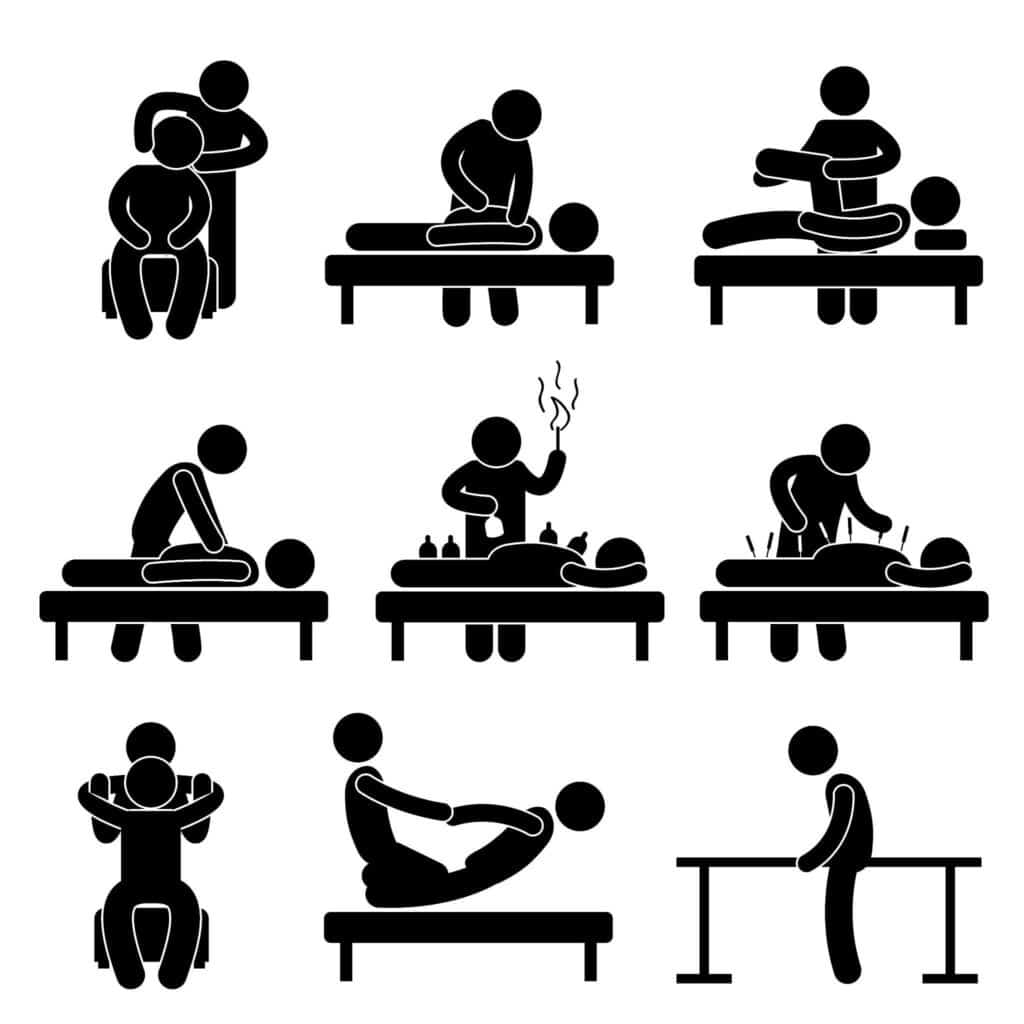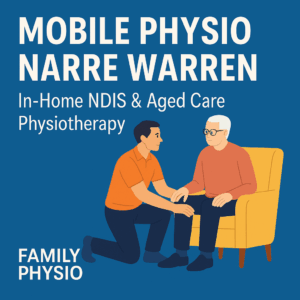Introduction
The NDIS, short for the National Disability Insurance Scheme, is a special program designed to help people with disabilities by providing them with access to various support services, including therapy to improve movement and overall well-being.
However, navigating the NDIS to find the right therapist, someone who is not only familiar with the program but also perfectly matches your needs, can feel like trying to solve a complex puzzle. It’s easy to get lost.
That’s why FamilyPhysio has created this guide to make the process straightforward and clear. We aim to guide you step by step, showing you how to find a therapist who understands your unique situation and can help you work towards your personal goals. This guide is here to simplify your journey, making it easier to get the support you need.

Understanding the Scope of NDIS Physiotherapy
The Role of NDIS-Accredited Physiotherapists
Physiotherapists within the NDIS framework are dedicated professionals committed to enhancing the functional abilities and overall quality of life for participants with disabilities. With a wide range of expertise spanning various conditions, NDIS-accredited physiotherapists offer personalized care plans designed to meet each individual’s specific needs and rehabilitation goals.
Their role is crucial in facilitating not just physical rehabilitation but also in fostering independence and improving the daily living capacities of their clients.
Conditions Commonly Addressed by NDIS Physiotherapy
The scope of conditions treated by NDIS physiotherapists is broad, covering everything from neurological disorders and chronic conditions to pediatric conditions and mental health challenges. The goal of physiotherapy under the NDIS is to provide a tailored therapeutic approach that addresses the unique needs of each condition.
Below is a table that outlines some common conditions treated by NDIS-accredited physiotherapists, along with the primary physiotherapy goals associated with each condition.
Condition | Physiotherapy Goals |
Neurological Disorders | Improve strength, coordination, and balance |
Chronic Conditions | Manage pain, maintain mobility |
Pediatric Conditions | Enhance physical development and function |
Mental Health | Boost overall wellbeing through physical activity |
This table serves as a snapshot of the diverse capabilities of NDIS physiotherapists and the broad spectrum of conditions they can help manage.

Selecting the Right NDIS Physiotherapist
Setting Your Rehabilitation Goals
Before you start looking for a physiotherapist, it’s really important to know what you want to achieve. Think about your goals in a way that’s SMART – specific, measurable, achievable, relevant, and time-bound. For example, you might want to move around more easily, reduce long-term pain, or get better at doing things on your own every day.
Having clear goals helps you find the right therapist and lets them show you exactly how they can help you meet your targets
Researching and Gathering Referrals
Beginning your search might feel like a lot, but mixing internet searches with tips from people you know can make it easier. Use the NDIS tool online to find approved physiotherapists near you.
Also, talking to doctors or specialists you see can help because they know a lot of therapists and can suggest good ones. And don’t forget to ask your friends or family who are also using the NDIS for their advice.
They’ve been through it and can share useful tips based on their own experiences.
Evaluating Expertise and Compatibility
Finding a physiotherapist with the right qualifications is only part of the equation; ensuring they are a good fit for you personally is equally important.
This involves considering their experience with your specific condition, their treatment philosophy, and their communication style.
It’s essential to feel comfortable and understood by your physiotherapist, as this relationship is pivotal to your rehabilitation journey. Don’t hesitate to ask potential therapists about their approach to treatment and their experience working with similar cases to yours.
The Comprehensive Role of NDIS-Accredited Physiotherapists
Customized Care and Collaborative Goal Setting
NDIS physiotherapy is characterized by its personalized care approach. Upon selecting a physiotherapist, the next step is to collaborate on developing a customized treatment plan.
This plan is tailored to meet your specific goals and is regularly reviewed and adjusted as needed.
The collaborative nature of this process ensures that you are actively involved in your recovery and that the therapy remains aligned with your evolving needs.
Diverse Treatment Strategies
NDIS-accredited physiotherapists employ a variety of treatment strategies to address the holistic needs of participants. These strategies might include:
- Exercise Programs: Tailored routines designed to improve strength, flexibility, endurance, and coordination.
- Manual Therapy: Hands-on techniques aimed at reducing pain, enhancing movement, and improving function.
- Lifestyle Modifications: Advice and support on incorporating healthy habits and ergonomics into daily life to support overall well-being.
- Telehealth Services: Offering remote consultations to ensure accessible and consistent care, particularly beneficial for individuals with mobility challenges or those living in remote areas.

Navigating NDIS Physiotherapy Services
Understanding Funding Options
Navigating the financial landscape of NDIS physiotherapy services is a critical component of accessing care. The NDIS offers three primary management options for your funding:
- Self-Managed: Where you have the flexibility to directly manage and pay for services from providers not necessarily registered with NDIS.
- Plan-Managed: Involves a third party managing the financial aspects of your plan, allowing access to both registered and non-registered providers.
- NDIA-Managed: Where the National Disability Insurance Agency (NDIA) manages your funding, restricting you to services from NDIS-registered providers only.
Understanding these options is paramount in making an informed decision that aligns with your needs and preferences. This decision affects how you access physiotherapy services, offering different levels of control and flexibility over the providers you choose.
The Importance of Service Agreements and Reporting
Entering into a service agreement with your physiotherapist establishes a clear framework for your therapeutic relationship.
This agreement outlines the goals of therapy, the services provided, and the expectations for both parties, including confidentiality and cancellation policies. Regular progress reporting is vital to this process, ensuring that your treatment plan remains aligned with your evolving needs and NDIS goals.
It provides a basis for adjusting therapy strategies to optimize outcomes and demonstrates the value and effectiveness of the services received, which is crucial for ongoing NDIS support.
FAQs on NDIS Physiotherapy
Yes, NDIS physiotherapy is designed to support a wide range of disabilities, including neurological, chronic, pediatric conditions, and mental health issues, by providing personalized therapeutic interventions.
Your physiotherapy goals under NDIS should be SMART: Specific, Measurable, Achievable, Relevant, and Time-bound, focusing on improving specific aspects of your mobility, pain management, or daily activities independence.
NDIS physiotherapy treatments are customized based on detailed assessments of your condition, with ongoing adjustments to the treatment plan based on your progress and feedback to ensure optimal outcomes.
Yes, the NDIS covers physiotherapy services for people with disabilities. This means if you’re part of the NDIS, you can get funding to help pay for physiotherapy sessions. These sessions are designed to improve your movement, reduce pain, and enhance your overall quality of life. The goal is to support your physical well-being and help you achieve your personal and rehabilitation objectives.
Choose a physiotherapist with experience in your specific condition, a compatible treatment philosophy, and effective communication skills to ensure a productive and comfortable therapeutic relationship.




